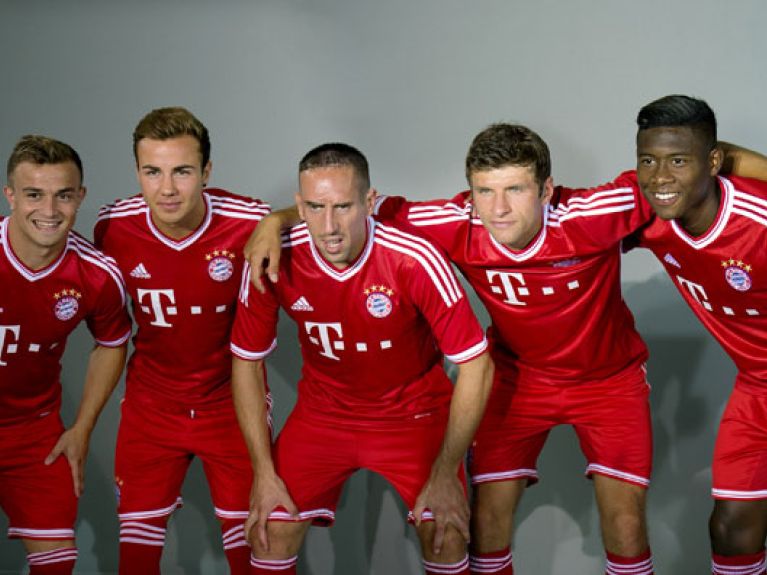The Liga
In its 50th year, the Bundesliga excels at providing world-class entertainment.

Nobody invented the ball, but the English invented football and the Brazilians beautiful football. In Brazil, there are reputedly 37 words for bola, ball. Having so many words for one and the same thing is usually a good sign. A sign of love – which invariably produces more words than are necessary. Except that the coinage “Bundesliga” doesn’t exactly sound like a declaration of love. Not even like a glamorous brand-name article in the same category as “Premier League” or “Serie A”. Bundesliga – that sounds more like the result of an official decree issued by Germany’s highest national football authority. But 50 years after this name made its belated debut in the world of football – all of Germany’s European neighbours having long had their own national leagues – the Bundesliga has become something its name initially failed to evoke at all: a premier brand of top-class entertainment, known throughout the world – and a projection of collective passion, acted out every match day by more than 400,000 people in Germany’s football stadiums.
The Bundesliga has never been as cool and young as in its 50th year. But that hasn’t meant pandering to a youthful audience. It has created its own aura of youthfulness, by its internationally admired promotion of young talent, which has produced up-and-coming stars like Götze and Reus, Müller and Draxler. And by employing a youthful, dynamic style of play which, developed by Borussia Dortmund and refined by Bayern Munich, has taken Europe by storm just in time for its 50th anniversary – with a Bundesliga members-only outing to the world’s most famous stadium for the all-German Champions League final. Wembley as the venue for a German football fest – that drew some ironic comments from the English with their proverbial sense of humour. The good thing about it, wrote one newspaper when Bayern and Borussia celebrated their victories in the semi-finals, is “that a German team will lose at Wembley for the first time in 47 years” – for the first time since the 1966 World Cup final.
In fact, England – whose Premier League was long considered the non plus ultra – long ago realized that the Bundesliga was worth emulating. The English supporters were the first to come, taking budget flights to Germany in search of a genuine – and affordable – football experience, for instance at matches played by second division club FC St. Pauli or in Dortmund. They were followed by English sports reporters who wrote about what makes the Bundesliga so exciting: low ticket prices, safe stadiums and a good atmosphere; the terraces and the beer stalls; the large proportion of young and female spectators that, since the 2006 World Cup, have increasingly made the crowds attending football matches a representative cross-section of German society as a whole; and, not least, club ownership structures, which mostly stipulate that the clubs themselves are the owners – in other words their members and supporters.
That’s why the Bundesliga – even in its anniversary year 2013, at the peak of its sporting and financial success – has not degenerated into commercialism, remaining instead a popular source of entertainment and boasting many clubs that generate interest beyond their own particular region. These include unmistakeable clubs like Schalke 04, the pacesetter in Germany’s most passionate football region, the Ruhr District. Like Werder Bremen, a club that stands for continuity and exudes the leisurely charm of a region where going to a match may involve taking a ferry. Like Borussia Mönchengladbach, a club synonymous with a fresh style of football. Or SC Freiburg with its limited financial resources but skill at promoting young talent – and its concept of sustainability that involves countering other clubs’ efforts to woo away its talented young players by steadfastly pursuing strategies to develop its own fresh talent.
And, like trusses supporting the Liga, there are those regional giants that have seen better days, like Hamburger SV or VfB Stuttgart. Or the long-established clubs that at some point ended up alternating between the Bundesliga’s first and second divisions without losing their profile or popularity, such as Eintracht Frankfurt, 1. FC Köln and 1. FC Kaiserslautern. All of these clubs are older than the Liga itself. But today they, too, can only really retain their importance if they are – and remain – members of the league that was founded in 1963 as one of last European national leagues and, in 2013, now leads the field across Europe. ▪
Christian Eichler
